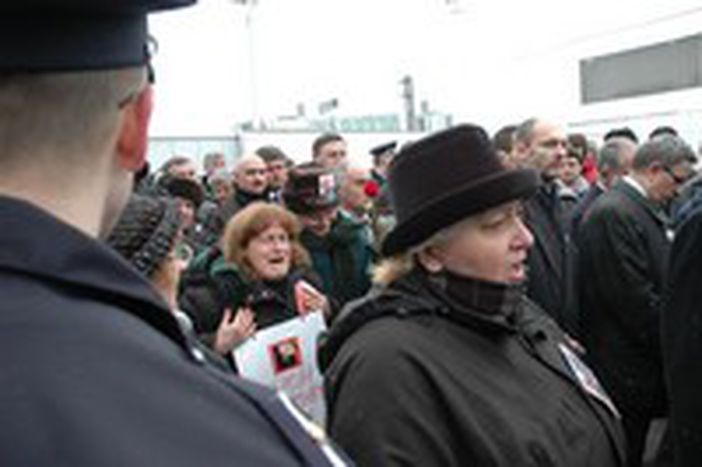
Dangerous liaisons: Eastern populists meet Western democrats
Published on
In Serbia, Poland and Hungary, nationalists and populists are gaining ground. How have Western European democrats reacted in the past?
On March 18, 2006, Peter Handke joined the crowds at Slobodan Milosevic’s funeral. The former dictator, accused of genocide and instigating political assassinations, had long lost his power after the wide-spread demonstrations following the 2000 elections' scandal. Retired Russian marshals, communist leaders, Serbian politicians accused of war crimes, and shady members of the "new aristocracy" came to pay their respects. Right-wing extremists closed the march. For them Milosevic was an anti-American Robin Hood, the ultimate fighter against globalization. A fight embraced by anti-globalisation intellectuals such as Handke.
Anti-globalisation with a feudal face
Handke’s presence at the funeral does not prove he supports right-wing populism. On the contrary, Handke belongs to a group of German intellectuals who are very far from being populists and who promote the legacy of the 1968 generation. These new western left-wing intellectuals have cessed to question capitalism after regimes changes in Central and Eastern Europe. Their alternative spirit has been integrated into global, illusionary games. Ultimately the ideas of '68 have been eroded, their partisans are not revolutionaries any more, merely disillusioned reformers.
Their approach to globalization is as timid as their opposition to capitalism. They are not radical activists or warriors fighting capitalism. They do not want new class clashes; all they want is to make capitalism and globalisation more human. Their fight is a moral one, but this is enough to side them with anti-globalisation activists in the Balkans.
Their common features are limited though. In the West, anti-American trends belong to a democratic culture which criticizes capitalism and anti-democratic trends. These activists are not only independent from the nation state, but often oppose the nation state’s elite. They found their reasoning on the liberal-social ethics and certain Marxist notions.
Emerging from communism
The history of Eastern European anti-globalisation movements is completely different. Their rhetoric is populist and they are more authoritarian than subversive. How can the strange encounter of the Western liberal, anti-authoritarian activists and Eastern national right-wing movements be explained?
The causes date back to before the regime change in the East. When the Eastern block was still under communist rule, Western non-conformist intellectuals did not understand why their liberal and left-wing counterparts in the Eastern Europe were anti-communists. After the 1989 democratic transitions in Hungary, Poland and other Eastern countries, this tension somewhat evolved.
From 1989 onwards, liberal and left-wing intelligentsia opened markets, established the new pluralist institutions in ex-communist states. They fought for the values that had been and are still heavily criticised by radical Western intellectuals. Central Eastern European and Balkan intellectuals cannot, despite their beliefs, be as critical as their Western counterparts: they have to defend the democratic institutions against the right-wing populists and nationalists. In Eastern Europe, the right-wing politicians are necessary demagogic because these countries lack the solid conservative traditions which prevail in the West. And their criticism of globalisation stems from a desire to increase the state’s authoritative power instead of defending universal democratic values. Their leaders praise the popular mass democracy and reject liberalism arguing that it is a curse from the West. They reject individualism and deify the ancient, pure community spirit.
Inadequate encounters
The discourses of anti-globalisation activists and right-wing militants converge on certain issues but their meaning is conflicting and fundamentally different. The encounter between Western intellectuals and Eastern populists is a limited but dynamic alliance. It emerged during the Handke debate.
In Serbia, both national right wing activists and the extreme-right claim that the global conspiracy led by Western media is the root of the Serbian defeat. Notwithstanding these declarations, right-wingers are ready to approve laws which will encourage foreign investment. Their criticism of globalisation has a national character but has no social or economic dimensions.
Both Western democrats and Eastern populists fight the American influence. The most radical anti-American party in Europe is the Serbian Radical Party, the strongest political force in the Serbian parliament. No other anti-globalisation party in Europe can count on such a wide public basis. This party keeps running the anti-American rhetoric only for national interests, whereas the West-European anti-globalisation advocates do it to defend the democratic values.
Handke, a Balkan Ulysses
For Serbian right-wingers, extremists and nationalists, Handke is a knight fighting to obtain "Justice for the Serbs". Handke's travels ethnically homogeneous Serb territories only made this belief stronger. This Ulysses of the Balkans searches for his ancient, untouched roots – his findings are nevertheless different from expectations.
It is an unquestionable fact that Handke's description of Serb peasants in his books Eine winterliche Reise zu den Flüssen Donau, Save, Morawa und Drina oder Gerechtigkeit für Serbien displays strongly romantic anti-globalisation sensations. Nevertheless, Handke’s bucolic images echo Serbian ethno-literature of the late 1980’s more than the mainstream rhetoric of Serbian politics.
The Handke debate is more about the strange relation between "Eastern populism" and the critical Western intellectuals than about Handke. In ex-communist countries, people increasingly disillusioned and have lost faith in the ideals which spurred their fight against dictatorships and authoritarian one-party systems. Western anti-authoritarian and non-conformist intellectuals criticise their same regime from a different point of view. The encounter of the critical West European intellectuals and the populists of the Balkans is the product of a "trap situation".
The relation is limited but faced with the rise of Islamic fundamentalists and populist right-wing parties in European countries, we have to watch out for new allies.
Thanks to Lóránt Havas translator from Hungarian into English
Read the original unedited version of this article



